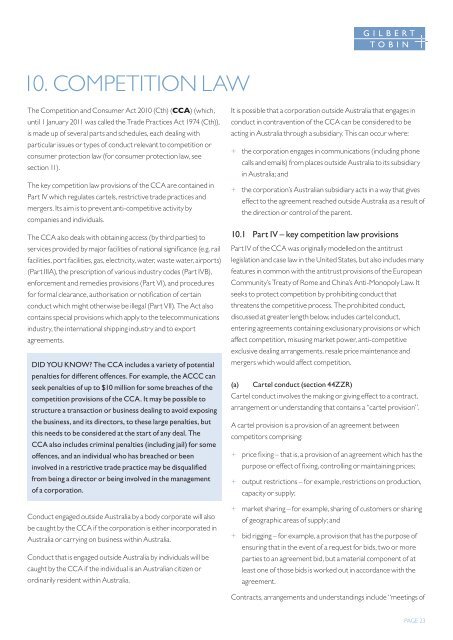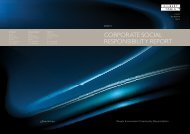Gilbert + tobin - Gilbert and Tobin
Gilbert + tobin - Gilbert and Tobin
Gilbert + tobin - Gilbert and Tobin
Create successful ePaper yourself
Turn your PDF publications into a flip-book with our unique Google optimized e-Paper software.
10. Competition law<br />
The Competition <strong>and</strong> Consumer Act 2010 (Cth) (CCA) (which,<br />
until 1 January 2011 was called the Trade Practices Act 1974 (Cth)),<br />
is made up of several parts <strong>and</strong> schedules, each dealing with<br />
particular issues or types of conduct relevant to competition or<br />
consumer protection law (for consumer protection law, see<br />
section 11).<br />
The key competition law provisions of the CCA are contained in<br />
Part IV which regulates cartels, restrictive trade practices <strong>and</strong><br />
mergers. Its aim is to prevent anti-competitive activity by<br />
companies <strong>and</strong> individuals.<br />
The CCA also deals with obtaining access (by third parties) to<br />
services provided by major facilities of national significance (e.g. rail<br />
facilities, port facilities, gas, electricity, water, waste water, airports)<br />
(Part IIIA), the prescription of various industry codes (Part IVB),<br />
enforcement <strong>and</strong> remedies provisions (Part VI), <strong>and</strong> procedures<br />
for formal clearance, authorisation or notification of certain<br />
conduct which might otherwise be illegal (Part VII). The Act also<br />
contains special provisions which apply to the telecommunications<br />
industry, the international shipping industry <strong>and</strong> to export<br />
agreements.<br />
Did you know The CCA includes a variety of potential<br />
penalties for different offences. For example, the ACCC can<br />
seek penalties of up to $10 million for some breaches of the<br />
competition provisions of the CCA. It may be possible to<br />
structure a transaction or business dealing to avoid exposing<br />
the business, <strong>and</strong> its directors, to these large penalties, but<br />
this needs to be considered at the start of any deal. The<br />
CCA also includes criminal penalties (including jail) for some<br />
offences, <strong>and</strong> an individual who has breached or been<br />
involved in a restrictive trade practice may be disqualified<br />
from being a director or being involved in the management<br />
of a corporation.<br />
Conduct engaged outside Australia by a body corporate will also<br />
be caught by the CCA if the corporation is either incorporated in<br />
Australia or carrying on business within Australia.<br />
Conduct that is engaged outside Australia by individuals will be<br />
caught by the CCA if the individual is an Australian citizen or<br />
ordinarily resident within Australia.<br />
It is possible that a corporation outside Australia that engages in<br />
conduct in contravention of the CCA can be considered to be<br />
acting in Australia through a subsidiary. This can occur where:<br />
+ + the corporation engages in communications (including phone<br />
calls <strong>and</strong> emails) from places outside Australia to its subsidiary<br />
in Australia; <strong>and</strong><br />
+ + the corporation’s Australian subsidiary acts in a way that gives<br />
effect to the agreement reached outside Australia as a result of<br />
the direction or control of the parent.<br />
10.1 Part IV – key competition law provisions<br />
Part IV of the CCA was originally modelled on the antitrust<br />
legislation <strong>and</strong> case law in the United States, but also includes many<br />
features in common with the antitrust provisions of the European<br />
Community’s Treaty of Rome <strong>and</strong> China’s Anti-Monopoly Law. It<br />
seeks to protect competition by prohibiting conduct that<br />
threatens the competitive process. The prohibited conduct,<br />
discussed at greater length below, includes cartel conduct,<br />
entering agreements containing exclusionary provisions or which<br />
affect competition, misusing market power, anti-competitive<br />
exclusive dealing arrangements, resale price maintenance <strong>and</strong><br />
mergers which would affect competition.<br />
(a) Cartel conduct (section 44ZZR)<br />
Cartel conduct involves the making or giving effect to a contract,<br />
arrangement or underst<strong>and</strong>ing that contains a “cartel provision”.<br />
A cartel provision is a provision of an agreement between<br />
competitors comprising:<br />
+ + price fixing – that is, a provision of an agreement which has the<br />
purpose or effect of fixing, controlling or maintaining prices;<br />
+ + output restrictions – for example, restrictions on production,<br />
capacity or supply;<br />
+ + market sharing – for example, sharing of customers or sharing<br />
of geographic areas of supply; <strong>and</strong><br />
+ + bid rigging – for example, a provision that has the purpose of<br />
ensuring that in the event of a request for bids, two or more<br />
parties to an agreement bid, but a material component of at<br />
least one of those bids is worked out in accordance with the<br />
agreement.<br />
Contracts, arrangements <strong>and</strong> underst<strong>and</strong>ings include “meetings of<br />
PAGE 23







